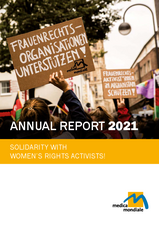medica mondiale annual report 2021
Working together to defend opportunities
Sybille Fezer on the situation for women’s rights in Afghanistan and other conflict regions in 2021
How has the situation developed for women’s rights in the past year?
Around the world we have observed attacks on women’s rights. Activists who campaign for the rights of women and girls are being threatened and obstacles are being put in the way of their work. The Taliban seizing power in Afghanistan was a particularly upsetting low point but in other conflict regions, too, women’s rights activists are being targeted. We are following these developments with great concern. Women’s rights activists and civil society organisations are the ones working day in and day out to stabilise their societies and build peace. So now they particularly deserve our solidarity!
In Summer 2021 the Taliban seized power in Afghanistan. What does that mean for the work of medica mondiale?
These developments in Afghanistan were one of the greatest challenges we have ever faced as an organisation. For 20 years we have been supporting women affected by violence together with our Afghan partner organisation but as the Taliban seized power, our partners’ lives were suddenly in acute danger. We set up a crisis committee which worked around the clock for weeks to help them reach safety. Successfully! Of course, it was a severe setback to our longstanding work in the country, but one thing is clear: We will continue supporting women and girls in Afghanistan.
The regime change in Afghanistan was not the only crisis of the past year...
As a women’s rights organisation that works in conflict regions, we are accustomed to crises and setbacks. Nonetheless, the last couple of years placed great demands on us. The Covid-19 pandemic meant we were frequently called upon to adapt projects, all while dealing with our own staff absences due to illness. Then there were natural disasters such as the volcanic eruption in DR Congo. Of course, we also feel the consequences of political developments. Many countries are placing restrictions on civil society, with activists losing opportunities to take action and have an impact.
How are medica mondiale and its partner organisations responding to these developments?
In spite of all the stress, burdens and hostilities, our partners are demonstrating enormous strength. They are seeing huge successes from their work, defending their freedom to act and creating new opportunities. In Germany, too, we have made progress together with our allies. For instance, the new government has firmly placed a responsibility for women’s rights into its coalition agreement, in both foreign and domestic policy. We experience a lot of solidarity with and among women’s rights activists, at our partner organisations and also from our supporters. This empowers and encourages us to continue our work.
Does the war in Ukraine have an influence on the work of medica mondiale?
With almost 30 years of experience in war and crisis areas, we know that the situation in Ukraine is one where there is an increased risk of sexualised violence for the women and girls there. The women and girls in the country and those who have fled to seek refuge are in need of protection and support. We are in contact with women’s rights organisations throughout Europe and in Ukraine: we are sharing with them our expertise in psychosocial support for women affected by violence, and since May 2022 we have been offering them appropriate training courses.
What is the outlook for 2022?
One priority will be the continuation of our work in Afghanistan. We are in close contact with our Afghan colleagues and other activists inside and outside the country who continue to work for women’s rights. In West Africa, South-east Europe and the African Great Lakes Region, 2022 will see an even stronger focus on multi-country programs, promoting networking among our partners. And we are pleased that business trips are slowly becoming possible again. Even though digital platforms have now become a routine part of our daily work, an online meeting cannot deliver everything we gain from a face-to-face exchange with our partners.



